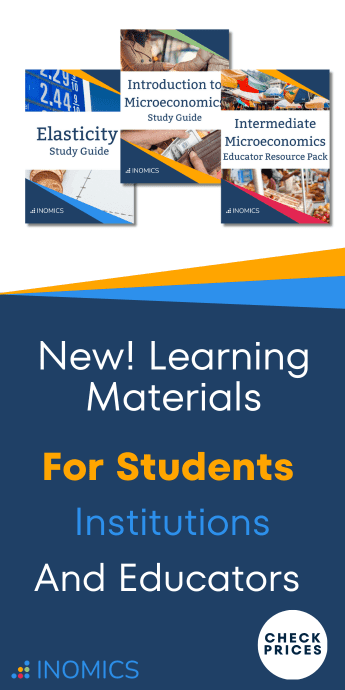
Looking Forward
A Career in Microeconomics
Read a summary or generate practice questions using the INOMICS AI tool
Microeconomics is one of the most prominent subfields of economics and is one which many people studying economics find themselves drawn to. But if you are studying economics now and you decide to specialise in microeconomics, what kind of career options would be open to you? To assist you in planning your career, we're listing some of the top career paths for different economics specialisations, and today we're looking at the top career paths for specialists in microeconomics.
 Work for the government
Work for the government
One of the biggest employers of microeconomics specialists is the government. Politicians rely on microeconomists to help them to devise policies, and then to put them into action. These policies will generally be in areas such as employment, corporate regulation, or international trade – areas in which microeconomists have particular insight.
For those who wish to put their economics knowledge into direct practice, this is an appealing career. If you specialise in, say, the effects of raising the minimum wage on local businesses, you will find many departments to whom you could provide useful input. The specialised knowledge which you possess can have a real impact on which policies are approved and are eventually put into place.
The advantage of working for the state is that such jobs are generally very secure, and you can typically stay in them for life if you want. These jobs also tend to have good benefits like excellent health care coverage and plenty of vacation days. The disadvantage is that working within the government can be frustrating due to the slow pace and the difficulties of getting all the different stakeholders to agree on a policy. It is work which is suited to someone who is patient, good at explaining complicated economic issues to non-experts, and who is willing to work alongside people of different political beliefs and values. Alternatively, you might work on government policy indirectly as a researcher for an NGO or an academic institution, for example. These jobs offer some of the same benefits as working for the government, such as the chance to influence policy, but they also tend to be less secure in the long term and to be less well paid.
Suggested Opportunities
- Professional Training Course
- (Online)
- Posted 4 days ago
BSE Competition Economics Executive Courses
Starts 14 May at Barcelona School of Economics in Barcelona, Spain
- Summer School
- (Online)
- Posted 4 days ago
6th Edition of International School for Advanced Training
Starts 17 Jun at Centro Ricerche Economico e Sociali Manlio Rossi - Doria, Università Roma Tre in Rome, Italy Work for a large business
Work for a large business
Microeconomists are often employed by large companies to help them assess the supply and demand in their sector, or to understand the various costs of business in order to set prices or allocate resources. With their knowledge of principles like supply and demand, market failure, or opportunity costs, microeconomists can be helpful to understand and optimise the workings of a large, complicated business.
Microsoft, for example, has its own microeconomics research group of full time researchers, postdocs, research assistants, and visiting scholars. The group examines how the development of information technology is affecting the global economy, in order to provide data on the current status and possible future status of the IT industry. The group covers topics like machine learning, computer science, and computational social science. Microsoft uses this information to plan their future research, sales, and marketing strategies.
This work is similar to that which would be performed in a university research group, but as it is part of a business it is more tightly focused. In some ways, this can lead to more limitations than in universities as researchers must work on the topics assigned to them by the company, however, in other ways, it is more freeing as there is less pressure to constantly produce publishable results. This kind of work is suited to someone who can handle big ideas and high demands that are set by large international companies. If you can deal with this, then there is potentially excellent pay and very interesting work to be done.
-
- Conference
- Posted 1 week ago
SASCA PhD Conference 2024 – Call for papers
Between 23 Sep and 24 Sep in Venice, Italy
-
- Conference
- Posted 2 weeks ago
35th RSEP International Conference on Economics, Finance and Business
Between 27 Jun and 28 Jun in Paris, France
-
- Summer School
- Posted 2 weeks ago
The Economics of Poverty and Inequality: Global Challenges in the 21st Century
Starts 1 Jul at UB School of Economics, University of Barcelona














